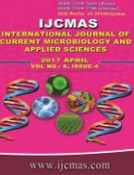


 National Academy of Agricultural Sciences (NAAS)
National Academy of Agricultural Sciences (NAAS)

|
PRINT ISSN : 2319-7692
Online ISSN : 2319-7706 Issues : 12 per year Publisher : Excellent Publishers Email : editorijcmas@gmail.com / submit@ijcmas.com Editor-in-chief: Dr.M.Prakash Index Copernicus ICV 2018: 95.39 NAAS RATING 2020: 5.38 |
Pigeonpea (CajanusCajan L.) is the second most important pulse crop after Chickpea which constitutes a major protein-rich food supplement for most Indians. Among pulses, pigeonpea observed to be a major source of protein for about 20 % of the world population and with rich source of minerals and vitamins. Pigeonpea dal is playing a vital role as a staple food across the country and playing an important role in National Economic and Nutritional Security. Pigeonpea is widely grown in India with 3.56 m ha, which contributes 76 % of global area and 2.31 m tonnes of global production. But present rate of consumption and demand of pulses is increasing annually by 3.3 %. In this endeavour, the use of hybrid pigeonpea technology has potential to increase the yield. The present investigation consists of 16 entries sponsored by IIPR, Kanpur was conducted at Zonal Agricultural and Horticultural Research Station, Hiriyur, Chitradurga district, Karnataka during 2015-16 kharif season to study their potentiality mainly with respect to yield and yield attributing traits. The results revealed that there was a significant difference among all the parameters; which indicates that the existence of sufficient variation for effective selection. NTL 30 entry recorded higher yield of 1719 kg/ha followed by SKNP 1216 entry of 1555 kg/ha. The reason behind this higher yield might be because of more number of branches and pods per plant (154) and 100 seed weight (12g).
 |
 |
 |
 |
 |